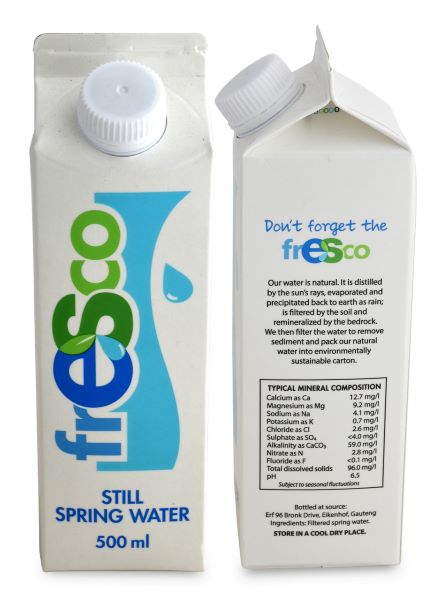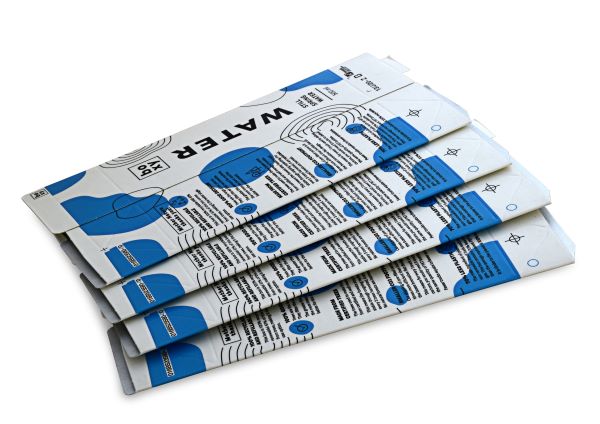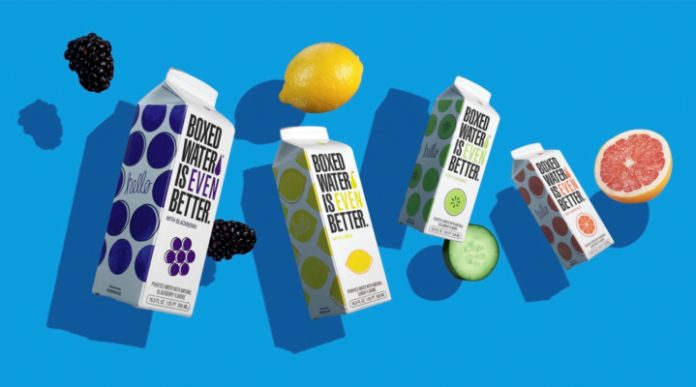Sustainability continues to be a force of change in the consumer goods market. In an IBM consumer survey, 80% of respondents indicate sustainability is important to them, while nearly six in 10 are willing to change their shopping habits to reduce environmental impact. Sustainable alternatives in packaging can offer a solution to eco-conscious consumers wanting to shift their buying behaviour.
In the global beverage market, water is one of the biggest selling categories, driven by health and wellness trends, and this is where opportunities for sustainable alternatives to traditional packaging are gaining traction. Many water brands are turning to beverage cartons as a practical and eco-friendly packaging solution to meet the demands of sustainably minded consumers.
Supporting sustainability through packaging
US-based Boxed Water® was launched in 2009, with the purpose of ‘changing the way packaged water is shipped, sold and enjoyed’, by choosing cartons instead of plastic bottles or aluminum cans. Since then, the brand has seen a growing appetite for sustainable solutions among consumers. Rob Koenen, Chief Revenue Officer for Boxed Water is Better, says, “Our customer base is also increasing and attracting the attention of the younger generations, which is critical – as Millennials and Gen Zs are the drivers for the future of our planet’s resources.”
 Similarly, in Spain, Fontsoria aims to reduce the environmental impact of water packaging. As one of the pioneers to introduce natural spring water in cartons to the Spanish water market, the company has seen sales more than double since launching its Agua enCaja Mejor, meaning “Water in Box is Better”, in 2017.
Similarly, in Spain, Fontsoria aims to reduce the environmental impact of water packaging. As one of the pioneers to introduce natural spring water in cartons to the Spanish water market, the company has seen sales more than double since launching its Agua enCaja Mejor, meaning “Water in Box is Better”, in 2017.
Why is water in beverage cartons considered sustainable? Working with liquid carton producer Elopak, these water brands are playing a part in the shift towards a low carbon circular economy. Elopak’s Pure-Pak® cartons are primarily made from paper fibre, a naturally renewable raw material sourced from responsibly managed forests, where new trees are continuously planted to replace the ones harvested for timbere beverage cartons are recyclable where infrastructure is in place and can be used to manufacture other products.
The beverage cartons also offer a low carbon footprint, as the paper comes from a naturally renewable resource with significantly lower emissions than fossil raw materials, such as coal and petroleum. Shipping of pre-filled cartons is more effective than bottles, as cartons are flat, taking up less space during transportation.
In Italy, Fonte Margherita made the decision five years ago to ensure their packaging was to be as sustainable as possible while preserving the characteristics of their water product. Working with filling machine company Galdi, packaging producer Italpack, and FILLgood, which specialises in research and development for the food and beverage industry, Fonte Margherita launched the country’s first water in gable top cartons for the retail and hospitality sectors respectively in 2019.
“We were pleasantly surprised at how receptive the market was, both in the hospitality sector, with the product now available at many restaurants, and also through new channels, like the vending machine market, where cartons have replaced plastic bottles,” says Nicola Sartore, Managing Director at Fonte Margherita. “The cooperation with FILLgood was so successful that, after the 500ml pack, we are now working on the 330ml version to tap into a market segment we are not reaching at the moment.”
Local businesses welcome water in beverage cartons
Why is water in beverage cartons considered sustainable? Working with liquid carton producer Elopak, these water brands are playing a part in the shift towards a low carbon circular economy. Elopak’s Pure-Pak® cartons are primarily made from paper fibre, a naturally renewable raw material sourced from responsibly managed forests, where new trees are continuously planted to replace the ones harvested for timbere beverage cartons are recyclable where infrastructure is in place and can be used to manufacture other products.

The beverage cartons also offer a low carbon footprint, as the paper comes from a naturally renewable resource with significantly lower emissions than fossil raw materials, such as coal and petroleum. Shipping of pre-filled cartons is more effective than bottles, as cartons are flat, taking up less space during transportation.
In Italy, Fonte Margherita made the decision five years ago to ensure their packaging was to be as sustainable as possible while preserving the characteristics of their water product. Working with filling machine company Galdi, packaging producer Italpack, and FILLgood, which specialises in research and development for the food and beverage industry, Fonte Margherita launched the country’s first water in gable top cartons for the retail and hospitality sectors respectively in 2019.
“We were pleasantly surprised at how receptive the market was, both in the hospitality sector, with the product now available at many restaurants, and also through new channels, like the vending machine market, where cartons have replaced plastic bottles,” says Nicola Sartore, Managing Director at Fonte Margherita. “The cooperation with FILLgood was so successful that, after the 500ml pack, we are now working on the 330ml version to tap into a market segment we are not reaching at the moment.”
Local businesses welcome water in beverage cartons
It’s not just abroad where water in beverage cartons is gathering momentum. In South Africa, father and daughter Jan and Danielle Strydom made the decision to package the spring water on their farm near Potchestroom in an environmentally friendly way. They launched Boxy Water in 2020, partnering with Nampak Liquid Cartons to package their water in beverage cartons.
Jan says, “Danielle felt that the future for water packaging cannot be PET plastic because people, especially the younger generation, have become more in tune with environmental issues. They are more aware of the amount of plastic that gets dumped on a daily basis and what an impact that has on our environment.”
Boxy Water are now also filling 300ml and 500ml cartons for other companies in South Africa that share the same view regarding sustainable packaging, and have promoted water in beverage cartons at numerous popular outdoor lifestyle events, such as the SA Cup Mountain Biking Race this year.
Another brand to choose cartons for their spring water is Fresco, part of the Bandini Group. The gable-top cartons not only provide an innovative, sustainable packaging alternative but ensure the water stays cool and germ-free, aligning with the brand’s promise of bringing a naturally pure product to consumers.
The aesthetic shelf- and brand appeal of water in beverage cartons means they are able to make a strong impact in a competitive market. Beverage cartons also offer the opportunity for water producers to expand product lines and look for new partnerships that align brand purpose and consumer values, such as South African Ripple Water used by Levi’s to promote the clothing brand’s good water journey in its stores last year.
“As consumers are favouring brands who act sustainably, beverage cartons provide an innovative, environmentally conscious solution in the water market. Producers are beginning to see the advantages and opportunities to liquid paperboard packaging, and it’s been encouraging that a number of local businesses have turned to paperboard beverage cartons for their water packaging,” says Raymond Dube, Managing Director at Nampak Liquid Cartons.
With the growth of water in beverage cartons worldwide, producers need to act now if they are to get ahead of the pack in leveraging the benefits of this sustainable packaging alternative. As Koenen warns, it’s time for the industry to “catch up or get left behind.”








